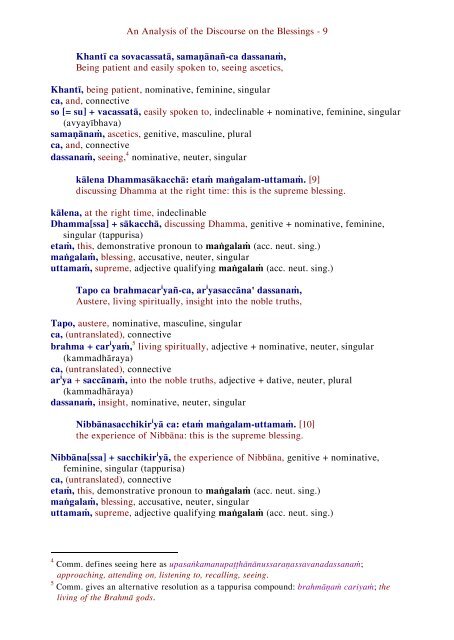Tisuttanirutti, A Grammatical Analysis of Three Discourses
A complete grammatical analysis of three of the most important discourses of the Pāli Canon (Maṅgala, Ratana and Mettā), showing relationship and meaning.
A complete grammatical analysis of three of the most important discourses of the Pāli Canon (Maṅgala, Ratana and Mettā), showing relationship and meaning.
You also want an ePaper? Increase the reach of your titles
YUMPU automatically turns print PDFs into web optimized ePapers that Google loves.
An <strong>Analysis</strong> <strong>of</strong> the Discourse on the Blessings - 9<br />
Khantī ca sovacassatā, samaṇānañ-ca dassanaṁ,<br />
Being patient and easily spoken to, seeing ascetics,<br />
Khantī, being patient, nominative, feminine, singular<br />
ca, and, connective<br />
so [= su] + vacassatā, easily spoken to, indeclinable + nominative, feminine, singular<br />
(avyayībhava)<br />
samaṇānaṁ, ascetics, genitive, masculine, plural<br />
ca, and, connective<br />
dassanaṁ, seeing, 4 nominative, neuter, singular<br />
kālena Dhammasākacchā: etaṁ maṅgalam-uttamaṁ. [9]<br />
discussing Dhamma at the right time: this is the supreme blessing.<br />
kālena, at the right time, indeclinable<br />
Dhamma[ssa] + sākacchā, discussing Dhamma, genitive + nominative, feminine,<br />
singular (tappurisa)<br />
etaṁ, this, demonstrative pronoun to maṅgalaṁ (acc. neut. sing.)<br />
maṅgalaṁ, blessing, accusative, neuter, singular<br />
uttamaṁ, supreme, adjective qualifying maṅgalaṁ (acc. neut. sing.)<br />
Tapo ca brahmacar i yañ-ca, ar i yasaccāna' dassanaṁ,<br />
Austere, living spiritually, insight into the noble truths,<br />
Tapo, austere, nominative, masculine, singular<br />
ca, (untranslated), connective<br />
brahma + car i yaṁ, 5 living spiritually, adjective + nominative, neuter, singular<br />
(kammadhāraya)<br />
ca, (untranslated), connective<br />
ar i ya + saccānaṁ, into the noble truths, adjective + dative, neuter, plural<br />
(kammadhāraya)<br />
dassanaṁ, insight, nominative, neuter, singular<br />
Nibbānasacchikir i yā ca: etaṁ maṅgalam-uttamaṁ. [10]<br />
the experience <strong>of</strong> Nibbāna: this is the supreme blessing.<br />
Nibbāna[ssa] + sacchikir i yā, the experience <strong>of</strong> Nibbāna, genitive + nominative,<br />
feminine, singular (tappurisa)<br />
ca, (untranslated), connective<br />
etaṁ, this, demonstrative pronoun to maṅgalaṁ (acc. neut. sing.)<br />
maṅgalaṁ, blessing, accusative, neuter, singular<br />
uttamaṁ, supreme, adjective qualifying maṅgalaṁ (acc. neut. sing.)<br />
4 Comm. defines seeing here as upasaṅkamanupaṭṭhānānussaraṇassavanadassanaṁ;<br />
approaching, attending on, listening to, recalling, seeing.<br />
5 Comm. gives an alternative resolution as a tappurisa compound: brahmāṇaṁ cariyaṁ; the<br />
living <strong>of</strong> the Brahmā gods.


















